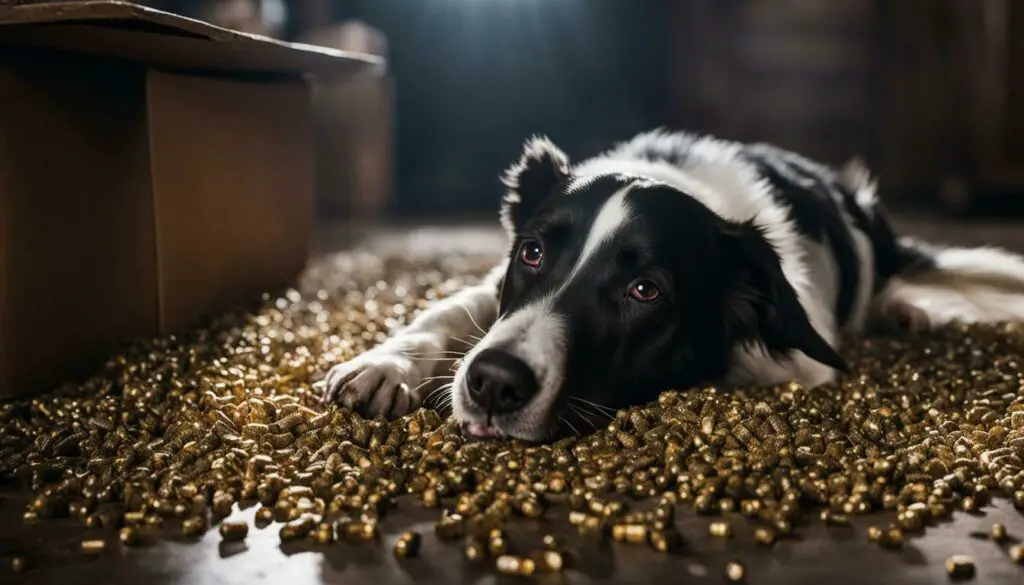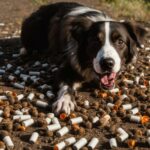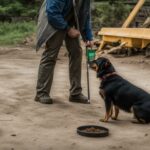If your dog has ingested rat poison, it is crucial to act quickly and be aware of the potential health implications. Different types of rat poison require specific treatments, so understanding the specific poison ingested is important. In this article, I will provide valuable insights and advice shared by Reddit users on dealing with this alarming situation.
Key Takeaways:
- Take immediate action if your dog ingests rat poison.
- Identify the specific type of poison ingested for appropriate treatment.
- Cholecalciferol poisoning can lead to kidney failure, ensure sufficient water intake and start treatment promptly.
- Bromethalin poisoning requires decontamination and medication to reduce brain swelling.
- Anticoagulant rodenticides can cause bleeding, administer blood or frozen plasma if necessary.
Types of Rat Poison and their Treatments
Different types of rat poison require different treatments to ensure your dog’s well-being. When it comes to dealing with a potential case of rat poisoning in your dog, it is important to understand the specific poison ingested to administer the appropriate treatment. Here are some common types of rat poison and their corresponding treatments:
Anticoagulant Rat Poisons:
Anticoagulant rat poisons, such as warfarin or bromadiolone, work by interfering with the blood’s ability to clot. If your dog has ingested this type of poison, it may take several days for symptoms to appear. Look out for signs of bleeding, such as blood in the urine or stool, nosebleeds, or excessive bruising. Immediate treatment may include inducing vomiting, administering activated charcoal to absorb the poison, and providing vitamin K as an antidote. In severe cases, blood transfusion may be necessary to restore normal clotting function.
Cholecalciferol Rat Poisons:
Cholecalciferol rat poisons, also known as vitamin D3 rodenticides, can be highly toxic to dogs. Symptoms may include vomiting, increased thirst and urination, loss of appetite, and weakness. If your dog has ingested cholecalciferol, it is crucial to seek immediate veterinary care. Treatment may involve decontamination of the digestive system, administration of IV fluids to prevent dehydration, and medications to counteract the effects of the poison. Ongoing monitoring of kidney function is essential to prevent kidney failure.
Bromethalin Rat Poisons:
Bromethalin is a neurotoxic rat poison that can lead to brain swelling if ingested by dogs. Symptoms may include muscle tremors, seizures, loss of coordination, and difficulty breathing. If you suspect your dog has ingested bromethalin, contact your vet immediately. Treatment may include inducing vomiting, administering activated charcoal, and providing supportive care to reduce brain swelling. Monitoring your dog closely is vital to ensure their well-being and recovery.
Remember, time is of the essence when it comes to treating rat poison ingestion in dogs. If you suspect your dog has ingested rat poison, contact your veterinarian or the Animal Poison Control Center immediately for guidance. They will be able to assess the situation and provide appropriate instructions for your dog’s specific case.
Cholecalciferol Poisoning in Dogs
If your dog has ingested cholecalciferol poison, it is crucial to ensure they are taking in enough water and to start treatment as soon as possible. Cholecalciferol, a form of vitamin D3, can be found in some types of rat poisons. This particular poison is highly toxic to dogs and can lead to serious health issues, including kidney failure if not treated promptly.
The first step in addressing cholecalciferol poisoning is to encourage your dog to drink water. This helps dilute the poison in their system and supports the elimination process. If your dog is not drinking voluntarily, you may need to administer water using a syringe or turkey baster.
Treatment for cholecalciferol poisoning typically involves hospitalization and intensive care. Your veterinarian will likely induce vomiting to remove any remaining poison from your dog’s system. They may also administer activated charcoal to bind to the poison and prevent further absorption into the bloodstream. Additionally, IV fluids and medications may be necessary to stabilize your dog’s condition and support kidney function.
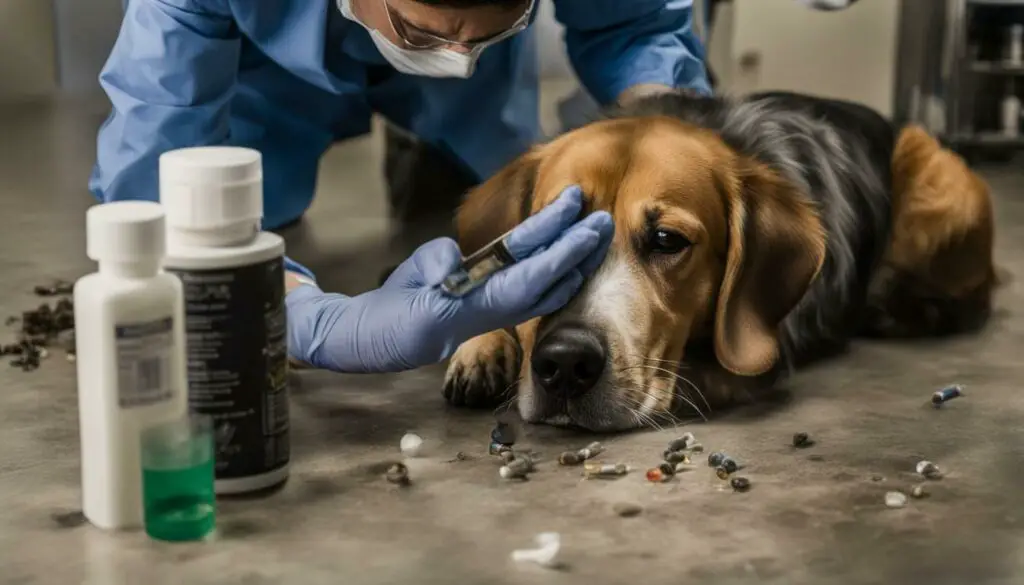
| Treatment for Cholecalciferol Poisoning | Actions |
|---|---|
| Encourage drinking | Ensure your dog is hydrated and encourage them to drink water |
| Vomiting Induction | Your vet may induce vomiting to remove the poison |
| Activated Charcoal Administration | Activated charcoal binds to the poison to prevent further absorption |
| IV Fluids and Medications | Administered to stabilize your dog’s condition and support kidney function |
It is important to seek immediate veterinary care if you suspect your dog has ingested rat poison containing cholecalciferol. Time is of the essence, as delaying treatment can result in irreversible damage to the kidneys. Remember to keep all rat poisons and potentially toxic substances securely stored and out of your dog’s reach to prevent accidental ingestion.
Bromethalin Poisoning and Decontamination
In cases of bromethalin poisoning, decontamination of the digestive system is necessary, along with IV fluids and medications to prevent brain swelling. Bromethalin is a potent neurotoxin found in some rat baits, and if ingested by your dog, it can lead to severe neurological symptoms and even death if left untreated.
To initiate decontamination, your veterinarian may induce vomiting or administer activated charcoal to help absorb the poison and prevent further absorption. It’s crucial to consult with a professional before inducing vomiting, as certain substances may pose additional risks if regurgitated.
Alongside decontamination measures, your dog will require close monitoring and supportive care. This includes intravenous (IV) fluid therapy to maintain hydration, as bromethalin can cause dehydration. Medications may also be administered to reduce brain swelling and minimize the neurological impact of the toxin.
Remember that bromethalin poisoning is a serious medical emergency, and time is of the essence. Contact your veterinarian immediately or reach out to the Animal Poison Control Center for guidance and assistance. With prompt and appropriate treatment, the prognosis for dogs affected by bromethalin poisoning can improve significantly.
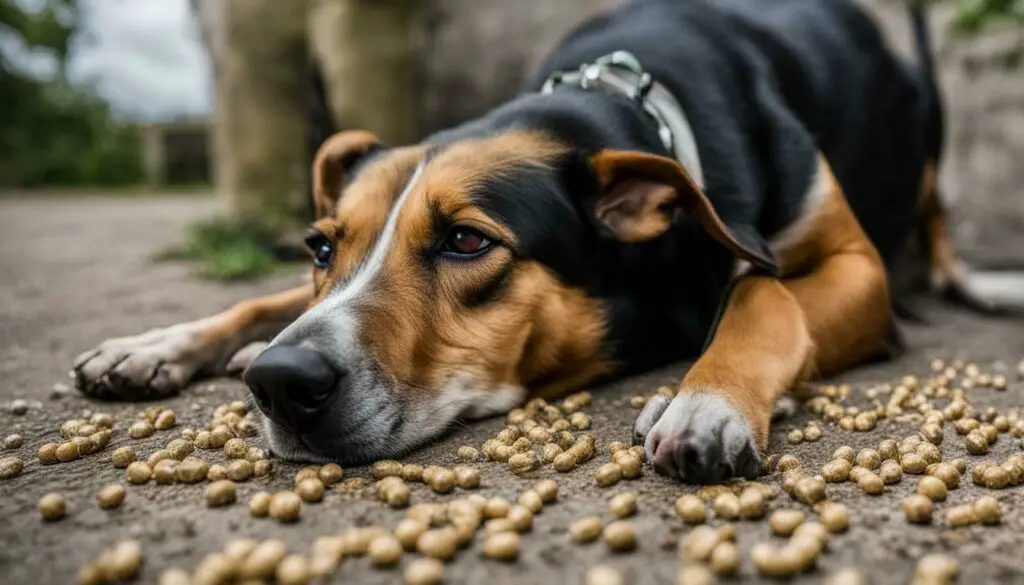
| Symptoms of Bromethalin Poisoning in Dogs | Treatment Options |
|---|---|
|
|
Anticoagulant Rodenticides and Bleeding Risks
Anticoagulant rodenticides can cause bleeding in dogs and require specific treatment measures to ensure their well-being. If your dog has ingested these types of poisons, it is crucial to understand the potential risks and take prompt action to minimize harm.
Bleeding can occur internally or externally, but symptoms may not be immediately noticeable. It is important to closely monitor your dog for any signs of abnormal bleeding, such as unexplained bruising, nosebleeds, blood in the urine or stool, or excessive bleeding from minor injuries. If you notice any of these symptoms, it is vital to seek immediate veterinary attention.
Treatment for anticoagulant rodenticide poisoning in dogs often involves blood transfusion to replenish clotting factors and prevent excessive bleeding. Vitamin K administration is also necessary, as it helps restore the body’s ability to clot blood properly. Regular blood tests will be conducted to monitor the dog’s clotting parameters and adjust the treatment accordingly.
To prevent further complications and aid in your dog’s recovery, it is crucial to follow your veterinarian’s instructions carefully. They may recommend additional treatments such as fluid therapy or supportive care depending on the severity of the poisoning. Remember, the sooner you seek professional help, the better the chances of a successful outcome for your furry friend.
Anticoagulant Rodenticides and Bleeding Risks – Treatment Measures
| Treatment Measures | Details |
|---|---|
| Blood Transfusion | Administered to replenish clotting factors and control excessive bleeding. |
| Vitamin K Administration | Helps restore the body’s ability to clot blood properly. |
| Regular Blood Tests | Monitor clotting parameters and adjust treatment as needed. |
| Fluid Therapy | May be recommended for additional support and hydration. |
Always consult with your veterinarian for the most appropriate and effective treatment plan tailored to your dog’s specific situation. Prompt action and proper medical care are crucial in ensuring a positive outcome and a safe recovery for your beloved pet.
Not Inducing Vomiting and Seeking Professional Help
It is important to avoid inducing vomiting in dogs that have ingested rat poison and seek professional help immediately. Inducing vomiting without proper guidance can potentially worsen the situation by causing the poison to be regurgitated and inhaled into the lungs. This can lead to aspiration pneumonia, which can be life-threatening for your furry friend.
If you suspect your dog has ingested rat poison, contact the Animal Poison Control Center helpline or your veterinarian right away. They will be able to provide you with the necessary guidance to handle the situation effectively. They may advise you to bring your dog in for immediate examination and treatment or provide instructions on how to manage the situation until professional help can be obtained.
Remember, time is of the essence when it comes to treating rat poison ingestion in dogs. The quicker you seek professional help, the better the chances of successful intervention and a positive outcome for your beloved pet.

Common Symptoms of Rat Poison Ingestion
- Bleeding from the nose, gums, or rectum
- Coughing up blood
- Blood in the urine or stool
- Lethargy
- Weakness or difficulty walking
- Loss of appetite
- Seizures or tremors
If your dog exhibits any of these symptoms after ingesting rat poison, it is essential to seek immediate professional help. Early intervention can greatly increase the chances of a successful recovery. Remember, your dog’s well-being is our top priority, and prompt action is crucial in such situations.
| Type of Rat Poison | Treatment |
|---|---|
| Cholecalciferol Poisoning | Ensure adequate water intake and immediate treatment to prevent kidney failure |
| Bromethalin Poisoning | Decontamination, IV fluids, and medications to reduce brain swelling |
| Anticoagulant Rodenticides | Blood or frozen plasma transfusion, along with vitamin K administration |
Each type of rat poison requires a specific approach to treatment. It is important to identify the type ingested to provide the appropriate care. Even if your dog appears to be fine initially, it is crucial to monitor them closely for any signs of poisoning, as symptoms may not always be immediately apparent.
Signs of Poisoning and Monitoring the Dog
The signs of poisoning in dogs may not be immediately noticeable, making it crucial to monitor them closely for any symptoms. Depending on the type of rat poison ingested, your dog may exhibit various signs of poisoning, which can include:
- Lethargy and weakness
- Loss of appetite
- Vomiting or diarrhea
- Unexplained bleeding or bruising
- Difficulty breathing
If you notice any of these symptoms or suspect that your dog has ingested rat poison, it is essential to seek immediate veterinary attention. Prompt intervention can significantly increase the chances of a successful outcome for your pet. Remember, time is of the essence, and delaying treatment can have serious health implications for your dog.
“Being vigilant and observant is crucial when it comes to detecting signs of poisoning. Any unusual behavior or symptoms should not be taken lightly – it’s always better to be safe than sorry.”
During the monitoring process, it is helpful to keep a record of your dog’s symptoms, including the time they occurred and their severity. This information can assist your veterinarian in determining the appropriate course of action and tailoring treatment to your dog’s specific needs.
Table 1. Signs of Poisoning
| Signs | Description |
|---|---|
| Lethargy and weakness | Decreased activity and lack of energy |
| Loss of appetite | Decreased or complete lack of interest in food |
| Vomiting or diarrhea | Expulsion of stomach contents or loose, watery stools |
| Unexplained bleeding or bruising | Visible blood or discoloration under the skin |
| Difficulty breathing | Labored or shallow breathing |
Remember, if you suspect your dog has ingested rat poison, it is crucial to contact a veterinarian immediately. They can provide appropriate guidance, treatment, and support during this potentially life-threatening situation.
Treatment Options for Dog Poisoning
Treatment for dog poisoning may include various options such as inducing vomiting, administering activated charcoal, and providing necessary medical interventions. The specific treatment will depend on the type of poison ingested and its effects on the dog’s health. It is crucial to seek immediate professional help and follow their guidance for the best course of action.
Inducing vomiting can be the first line of defense if the dog has ingested the poison recently. However, it is important to note that not all poisons should be induced for vomiting as it can worsen the situation. Always consult a veterinarian before attempting to induce vomiting.
Activated charcoal is commonly used to absorb toxins in the digestive system and prevent their absorption into the bloodstream. It can be administered orally, usually mixed with water, or through a feeding tube if necessary. The activated charcoal binds to the poison and helps eliminate it from the body.
Medical interventions may include blood transfusion, intravenous (IV) fluid therapy, and the administration of specific medications to counteract the effects of the poison. These interventions are typically determined by the veterinarian based on the specific type and severity of the poisoning.
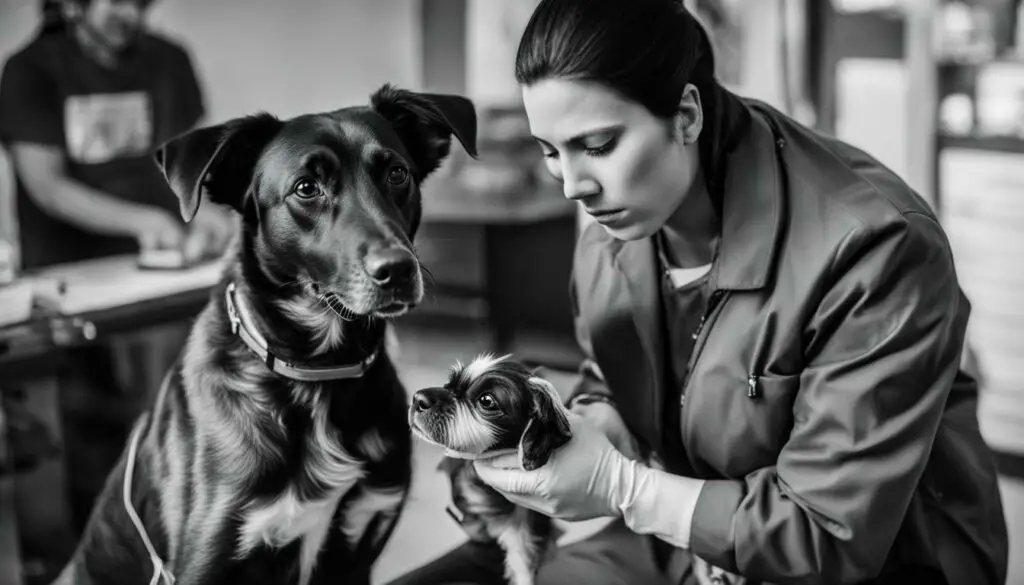
| Type of Poison | Treatment Options |
|---|---|
| Cholecalciferol Poisoning | Ensuring adequate water intake and starting treatment promptly to prevent kidney failure. |
| Bromethalin Poisoning | Decontamination of the digestive system, IV fluids administration, and medications to reduce brain swelling. |
| Anticoagulant Rodenticides | Administering blood or frozen plasma if needed, along with vitamin K as an antidote. |
- Monitor your dog closely for any signs of poisoning, such as vomiting, diarrhea, lethargy, difficulty breathing, seizures, or abnormal bleeding.
- Contact the Animal Poison Control Center and your veterinarian for immediate guidance and assistance.
- Follow the treatment plan provided by the veterinarian and provide ongoing care to ensure your dog’s well-being and recovery.
Summary:
Treating dog poisoning requires prompt action and professional help. Treatment options may include inducing vomiting, administering activated charcoal, and providing necessary medical interventions. The specific type of poison ingested will determine the appropriate treatment. It is vital to seek guidance from a veterinarian and closely monitor the dog for any signs of poisoning. Following the treatment plan and providing ongoing care are essential for a successful recovery.
Preventive Measures to Keep Dogs Safe
Taking preventive measures is crucial to ensure your dog’s safety, such as keeping rat poison securely stored and pet-proofing your home. Here are some essential steps to protect your furry friend:
- Store rat poison out of reach: Keep all rodenticides in secured cabinets or high shelves that your dog cannot access. Dogs are naturally curious and may be tempted to investigate or ingest substances that are within their reach.
- Pet-proof your home: Conduct a thorough assessment of your living space to identify potential hazards. Make sure there are no gaps or openings that your dog could squeeze through to access restricted areas. Also, check for any loose wires, toxic plants, or household chemicals that need to be safely stored away.
- Use pet-friendly alternatives: Instead of relying on toxic rat poison, consider using pet-friendly alternatives such as natural deterrents or traps that do not pose a risk to your dog’s health. Consulting with professional pest control services can help you explore safer options.
Remember, prevention is always better than a cure. By implementing these preventive measures, you can significantly reduce the chances of your dog ingesting rat poison and encountering the associated health risks.
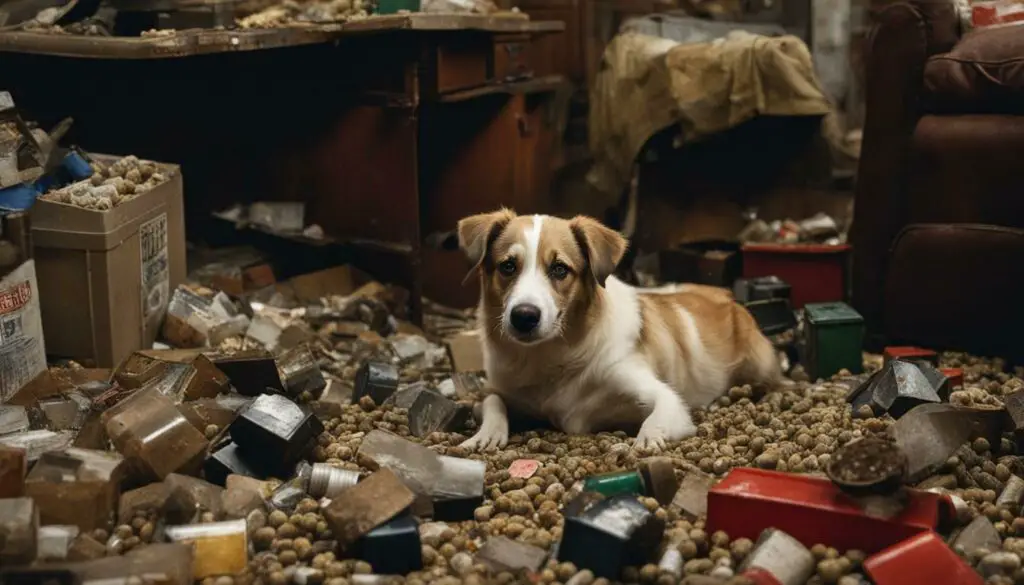
Creating a Safe Environment
Creating a safe environment for your dog involves being proactive and attentive to potential dangers. Here are a few additional safety tips:
- Regular yard inspections: Regularly inspect your yard for any signs of rodenticides or other hazards. Check for any burrows or nesting areas near your property and take appropriate measures to deter rodents.
- Supervise outdoor activities: When allowing your dog to roam in outdoor spaces, ensure they are under your supervision at all times. This will prevent them from encountering substances or objects that could pose a risk to their health.
- Education and awareness: Educate yourself and your family members about the dangers of rat poison and the signs of poisoning in dogs. Being aware of potential threats will enable you to respond quickly and effectively in case of an emergency.
| Emergency Contacts | Phone Number |
|---|---|
| Animal Poison Control Center | 1-888-426-4435 |
| Local Veterinary Clinic | Your clinic’s phone number |
Remember, your dog’s well-being is in your hands. By taking preventive measures and remaining vigilant, you can ensure a safe and healthy environment for your beloved pet.
Conclusion
It’s always a sad day when a pet owner has to come to the conclusion that their dog has ate rat poison. How did this happen? Did the dog eat poison that was left out for rats? Did the rat eat the poison and the dog ate the rat? No matter how it happened, it’s a serious situation that needs to be dealt with immediately.
If you think your dog has ate rat poison, the first thing you should do is call your veterinarian. They will be able to give you specific instructions on what to do next. It’s important to follow their instructions carefully as they will know exactly how much poison your dog has ingested and how to treat them accordingly.
If you can’t get in touch with your vet right away, there are some things you can do to help your dog. Try to get them to vomit by giving them a small amount of hydrogen peroxide. Make sure they have plenty of water to drink to help flush the poison out of their system. And, of course, keep an eye on them and if they start showing any signs of distress, call your vet ASAP.
Dog ate rat poison is a serious situation but, fortunately, it is something that can be treated if caught early enough. So, if you think your dog may have ingested rat poison, don’t delay in getting them the help they need.
It is essential to act swiftly if your dog ingests rat poison to ensure their safety and well-being. Different types of rat poison require specific treatments, such as prompt administration of fluids if your dog ingested cholecalciferol poison to prevent kidney failure. For bromethalin poisoning, decontamination and the use of IV fluids and medications are necessary to reduce brain swelling. Anticoagulant rodenticides pose a bleeding risk, requiring the administration of blood or frozen plasma and vitamin K as an antidote. It is crucial not to induce vomiting without veterinary guidance.
Additionally, recognizing the signs of poisoning and promptly contacting the Animal Poison Control Center and your veterinarian is essential for proper guidance and assistance. Treatment options for dog poisoning may include inducing vomiting, administering activated charcoal, blood transfusion, IV fluids, and specific medications depending on the type of poison ingested.
To prevent such incidents, it is important to keep rat poison out of your dog’s reach, securing it properly and pet-proofing your home. By being proactive in ensuring a safe environment, you can minimize the risk of your dog ingesting harmful substances. Remember, the health and well-being of your furry friend should always be a top priority.
FAQ
What should I do if my dog has ingested rat poison?
It is crucial to take immediate action and contact the Animal Poison Control Center and your vet for guidance. Treatment options may include inducing vomiting, administering activated charcoal, blood transfusion, IV fluids, and specific medications depending on the type of poison.
What are the different types of rat poison and their treatments?
Different types of rat poison require different treatments. Cholecalciferol poisoning may require ensuring the dog takes in enough water and starting treatment promptly to prevent kidney failure. Bromethalin poisoning may require decontamination of the digestive system, IV fluids, and medications to lower the risk of brain swelling. Anticoagulant rodenticides can cause bleeding and may require blood or frozen plasma administration and vitamin K as an antidote.
Should I induce vomiting if my dog has ingested rat poison?
It is important not to induce vomiting unless specifically instructed by a veterinarian. Contact the Animal Poison Control Center and your vet for guidance on the appropriate course of action.
What are the signs of rat poison poisoning in dogs?
Signs of rat poison poisoning may not be immediately noticeable. It is important to be vigilant and observe your dog closely for symptoms such as lethargy, weakness, loss of appetite, vomiting, diarrhea, bleeding, or seizures. Contact your vet immediately if you suspect poisoning.
How can I prevent my dog from ingesting rat poison?
To keep your dog safe, secure rat poison out of their reach and pet-proof your home. Store rat poison in inaccessible areas and consider using pet-friendly alternatives. Be aware of your dog’s surroundings while outside and prevent them from scavenging or eating unknown substances.
Source Links

